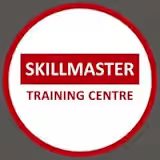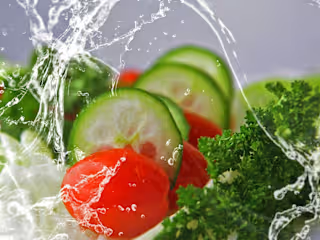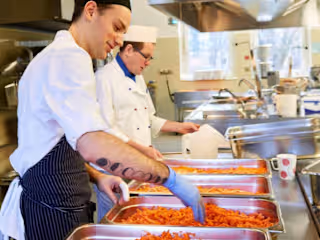Food Safety Hygiene Course Development

Food Safety Hygiene Course: Your First Step to a Safe Food Career
In any food business — whether it's a restaurant, food court, cloud kitchen, or catering company — keeping food safe and clean is not optional, it’s essential. The easiest and most effective way to make sure food handlers understand hygiene standards is through a proper Food Safety Hygiene Course.
This course is the first thing employers ask for when hiring. It proves that you’ve been trained, tested, and certified to handle food safely. In many countries like Singapore, India, UAE, and Malaysia, completing this course is also a legal requirement for all food handlers.
In this article, you’ll learn everything about the Food Safety Hygiene Course — what it covers, who should take it, what to expect, and how it helps your job and business.
What is a Food Safety Hygiene Course?
A Food Safety Hygiene Course is a short training program designed to teach people the correct way to handle, prepare, store, and serve food. It also covers how to keep work areas clean, avoid contamination, and follow personal hygiene rules.
Once you complete the course and pass the assessment, you will receive a certificate that confirms your understanding of food safety practices. This certificate is usually required by law before you can work in any food-related job.
Why Is This Course Important?
Unsafe food practices can lead to serious problems like food poisoning, allergic reactions, and business closures. That’s why governments and food agencies across the world insist on this course.
Here’s why the Food Safety Hygiene Course is so important:
✅ Protects Customer Health
Trained food handlers know how to avoid contamination and keep food safe.
✅ Reduces Risk of Foodborne Illness
You’ll learn how bacteria spreads and how to stop it through hygiene and temperature control.
✅ Required by Employers
Most F&B outlets will not hire workers unless they have completed this course.
✅ Helps During Food Inspections
If your workplace is inspected by health officers, having certified staff keeps you compliant.
✅ Boosts Career Growth
With a valid certificate, you can apply for better roles and earn more trust.
Who Should Take the Course?
The Food Safety Hygiene Course is required for anyone who handles food at work, including:
Cooks and kitchen staff
Waiters and service crew (if handling food)
Baristas and drink stall operators
Hawker stall assistants
Catering and banquet staff
Food packers and delivery personnel
Bakery and pastry staff
Supermarket fresh food workers
Cloud kitchen teams
Food production line workers
Even if you're a part-time or freelance food handler, you still need to take this course.
Topics Covered in the Food Safety Hygiene Course
The training includes both theory and hands-on practice to make sure you understand and remember the key hygiene steps.
🧼 Personal Hygiene
Proper handwashing techniques
When and how to wear gloves, masks, and hairnets
What to do if you’re unwell
🍗 Food Handling
Safe cooking, reheating, and cooling of food
Separation of raw and cooked ingredients
Preventing food spoilage
❄️ Food Storage
Safe temperatures for storing food
FIFO method (First In, First Out)
Labelling and expiry tracking
🔪 Cross-Contamination Control
Cleaning tools after use
Using different chopping boards and utensils
Avoiding mixing allergens or raw meats with ready-to-eat food
🧽 Cleaning and Sanitising
Cleaning surfaces, equipment, and workstations
Proper use of sanitisers
Daily and weekly cleaning schedules
🚫 Understanding Food Hazards
Biological hazards (bacteria, viruses)
Chemical hazards (cleaning agents, allergens)
Physical hazards (hair, plastic, dirt)
You’ll also learn how to report unsafe conditions and how to act during emergencies like customer complaints or sickness outbreaks.
Course Format and Duration
Most Food Safety Hygiene Courses are conducted over one full day.
Time: 8 to 9 hours
Format: Classroom-based, online, or blended learning
Languages Available: English, Tamil, Mandarin, Malay (varies by country)
Training Style: Videos, role play, group discussion, quizzes, hands-on demonstration
The course is easy to follow, even for people with no prior experience.
Assessment and Certification
At the end of the course, you’ll go through a short assessment to test your understanding. It usually includes:
Written Test: Simple multiple-choice questions
Practical Test: Tasks like correct handwashing or using proper food storage methods
Once you pass, you’ll get your Food Hygiene Certificate, which is your official proof that you’re qualified to work in food handling jobs.
Validity of the Certificate
In most cases:
Validity Period: 5 years
Renewal: You must take a Refresher Course before the expiry date
What Happens if Expired? You may not be allowed to work until renewed
Always check the expiry date and plan your refresher early to avoid last-minute issues.
Course Fees and Subsidy
The fee for the Food Safety Hygiene Course depends on the training provider and country:
Average Cost: $130 to $160
Subsidies Available: In places like Singapore, you can use SkillsFuture Credit, government funding, or employer-sponsored training
For Groups: Some companies offer bulk bookings for training their staff together at discounted rates
Eligibility Requirements
Most training providers require:
Minimum age: 16 years
Basic understanding of the language used in training
Physically able to perform simple tasks (like standing, handwashing, lifting light items)
There are no educational requirements, so even beginners or low-literacy participants can take part.
How to Register for the Course
Here’s a simple step-by-step process:
Find a government-approved training centre
Choose your preferred language and date
Register online or by phone
Pay the course fee (or use credits/subsidy)
Attend the training on your chosen date
Pass the assessment and get your certificate
Always keep a copy of your certificate ready for job applications or workplace records.
Benefits of Taking the Food Safety Hygiene Course
Here’s how this course helps you in real life:
✅ You meet food handling legal requirements
✅ You become more confident at work
✅ You prevent mistakes that cause customer illness
✅ You reduce the risk of getting fined during inspections
✅ You become eligible for more food service jobs
✅ You increase your chances of promotion
If you’re a food business owner, having trained staff with valid hygiene certs gives your customers peace of mind and protects your business from penalties.
What Happens If You Don’t Take the Course?
Working in a food-related job without certification can cause serious problems:
You might be removed from food handling duties
Your employer may get fined or lose their license
You may fail health inspections
You’ll have a harder time getting hired elsewhere
That’s why it’s always smart to take this course before starting any food-related work.
Conclusion
The Food Safety Hygiene Course is the most basic yet most powerful step to starting your career in the food industry. It’s affordable, short, and easy to complete — but the knowledge you gain lasts for years and helps protect the health of thousands of people.
Whether you’re a beginner in the kitchen or a food delivery rider, this course makes you more professional, responsible, and job-ready.
So if you're planning to work in food service, don’t wait. Book your seat, attend the course, and get your certificate. It’s your key to working safely, legally, and with confidence in the food and beverage world.
Like this project
Posted May 15, 2025
Developed a Food Safety Hygiene Course for food handlers.
Likes
0
Views
0








